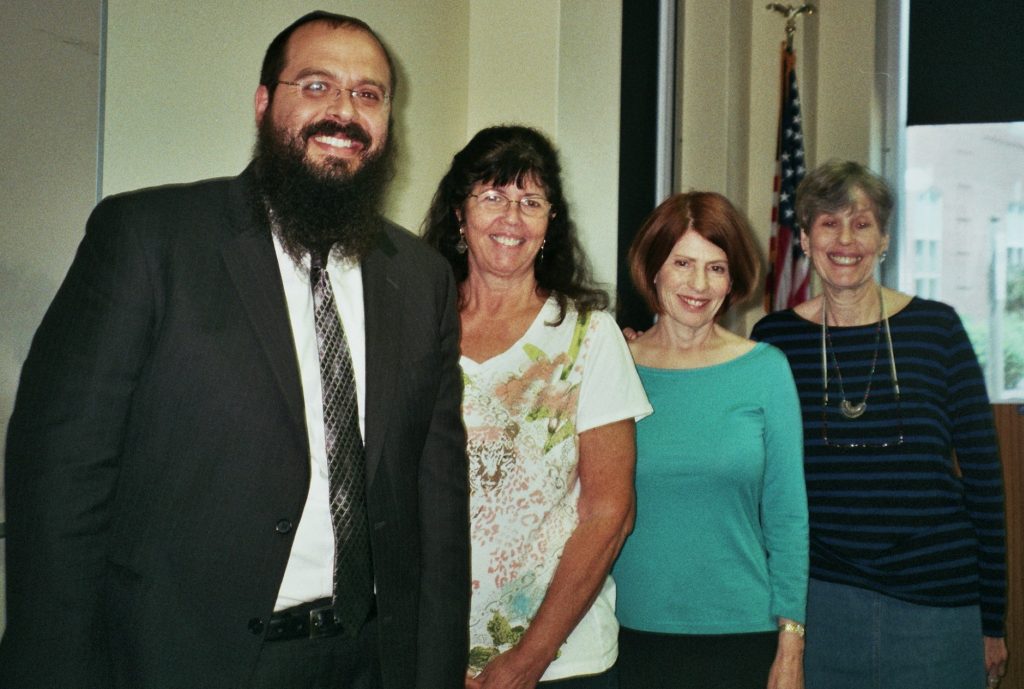In a thought-provoking three-part series, titled “Journey of the Soul: An Exploration of Life, Death, and What Lies Beyond,” Rabbi Shalom Lubin led our group on a roller-coaster of insights, teachings, and mystical concepts related to the emotionally charged and often challenging topic of death.
Rabbi Lubin’s talk was part of Our Jewish World’s Rabbi Lecture Series, coordinated by Melanie Levitan and Ellen Nesson.
The rabbi began the course by emphasizing that knowledge is empowering, and that ignorance is one of the greatest causes of fear associated with death. The rabbi, who serves as spiritual leader of Congregation Shaya Ahavat Torah in Parsippany and director of Chabad of Southeast Morris County in Madison, said that one of Judaism’s fundamental teachings is that life has purpose, and that a body and soul are united in life with a purpose—to make the world a godly place. If we are bringing godliness to the world—through kindness, good deeds, and how we treat people—we are fulfilling our purpose here. We all have our own unique qualities and therefore our own ways of infusing life with godliness. Knowing that life on earth is temporary allows us to appreciate and utilize each and every day to the fullest.
In the second session, the rabbi gave an overview of the journey of both body and soul after life has ended. This included a detailed description of the honor and respect accorded to the body during the process of taharah (ritual purifi-cation) and Jewish burial, as well as the origins of the various stages of the mourning process, and how they allow the family to truly honor both the body and soul of their loved ones.
The Afterlife
In the final session, Rabbi Lubin shared the traditional Jewish views of the afterlife (Yes, there is one!), and focused on the notion of responsible living. If life has meaning and purpose, then ultimately we hope that our actions matter, and that we one day will be responsible for our actions on earth, both positive and otherwise. All souls make their way to heaven, and can be positively impacted by actions performed on their behalf by family and friends on earth. (Think charity on behalf of the departed, and reciting prayers, especially Kaddish.)
The rabbi encouraged questions throughout the course, and stressed that questions can be empowering, and can lead to incredible growth opportunities. He encouraged the group to continue to ask questions about all topics in life, especially such vital ones concerning the topics of life, death, and what lies beyond.
‘Respect for the Soul’
In discussing the series, Melanie Levitan notes, “What I loved was Rabbi Lubin’s clear point that in describing the journey of the soul and the exploration of life, death and what lies beyond, he tantalized us by talking about why the soul takes a body, the meaning of life, and what all the Jewish rituals surrounding death mean—why they are done, how they affect the soul, and that the bottom line is respect for the soul.”
Adds Ellen Nesson, “Rabbi Lubin’s insights, stories, and even jokes offered the students in the class a thought-provoking, enjoyable and educational experience. His grasp of the complex issues we were learning about was presented in an accessible and interesting way.”
Susan Waldman, a series participant, observes, “Rabbi Lubin’s lecture series was not only informative, but he enhanced his presentation by intertwining current happenings and stories into his lessons. I thought his explanation of why Jews don’t proselytize was just one of the more interesting insights he gave us. He said that the reason is that ‘Jews don’t believe you have to be Jewish to go to heaven.’ As simple as that. This is just one tiny tidbit of everything this series offered. I am so happy that my husband and I were able to attend.”
‘Fascinating and Enlightening’
Ilene Dorf Manahan, another series participant, points out, “Rabbi Lubin took what most would consider a potentially depressing topic—the Jewish view of death and dying—and provided insights that were both fascinating and enlightening to all the attendees, no matter what their personal experience or religious perception of the issue. Further, he interspersed his learned and sensitive commentary with good humor and stories that punctuated his points and stimulated questions and discussion. His presentation of this series alone made it clear why Rabbi Lubin is highly esteemed as a terrific speaker and teacher who attracts attendees to his various classes and talks.”

